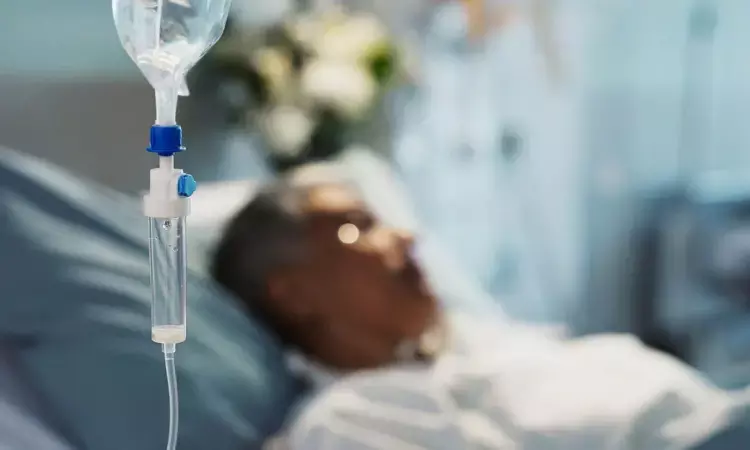- Home
- Medical news & Guidelines
- Anesthesiology
- Cardiology and CTVS
- Critical Care
- Dentistry
- Dermatology
- Diabetes and Endocrinology
- ENT
- Gastroenterology
- Medicine
- Nephrology
- Neurology
- Obstretics-Gynaecology
- Oncology
- Ophthalmology
- Orthopaedics
- Pediatrics-Neonatology
- Psychiatry
- Pulmonology
- Radiology
- Surgery
- Urology
- Laboratory Medicine
- Diet
- Nursing
- Paramedical
- Physiotherapy
- Health news
- Fact Check
- Bone Health Fact Check
- Brain Health Fact Check
- Cancer Related Fact Check
- Child Care Fact Check
- Dental and oral health fact check
- Diabetes and metabolic health fact check
- Diet and Nutrition Fact Check
- Eye and ENT Care Fact Check
- Fitness fact check
- Gut health fact check
- Heart health fact check
- Kidney health fact check
- Medical education fact check
- Men's health fact check
- Respiratory fact check
- Skin and hair care fact check
- Vaccine and Immunization fact check
- Women's health fact check
- AYUSH
- State News
- Andaman and Nicobar Islands
- Andhra Pradesh
- Arunachal Pradesh
- Assam
- Bihar
- Chandigarh
- Chattisgarh
- Dadra and Nagar Haveli
- Daman and Diu
- Delhi
- Goa
- Gujarat
- Haryana
- Himachal Pradesh
- Jammu & Kashmir
- Jharkhand
- Karnataka
- Kerala
- Ladakh
- Lakshadweep
- Madhya Pradesh
- Maharashtra
- Manipur
- Meghalaya
- Mizoram
- Nagaland
- Odisha
- Puducherry
- Punjab
- Rajasthan
- Sikkim
- Tamil Nadu
- Telangana
- Tripura
- Uttar Pradesh
- Uttrakhand
- West Bengal
- Medical Education
- Industry
Study Emphasizes Urgent Need for Early Recognition and Intervention in Critically Ill Patients

UK: A recent study published in Anaesthesia & Intensive Care Medicine emphasizes the critical need for timely identification and management of patients experiencing severe health deterioration. Critical illness often entails multiple organ failures, leading to substantial morbidity and mortality. The research reveals that most patients exhibit recognizable signs of physiological decline before organ failure occurs, yet these warning signs are overlooked, delaying necessary interventions.
Despite ongoing efforts to enhance the detection and management of critical illness, the study indicates that many healthcare providers miss early signs of deterioration. This oversight can result in delays in transferring patients to critical care units, which can be detrimental to patient outcomes. To address these challenges, the study advocates for standardized approaches that implement an effective "chain of response." Such systems are now being adopted worldwide to reduce the incidence of serious adverse events (SAEs), including in-hospital cardiac arrests and unplanned admissions to intensive care units (ICUs).
Key components of these systems include the accurate recording of vital signs, recognizing and interpreting abnormal values, and conducting rapid bedside assessments by trained teams. Early warning systems (EWS) are important in identifying patients at risk of deterioration, allowing for timely interventions to prevent adverse outcomes. The study underscores the importance of a structured assessment format, such as the ABCDE approach—airway, breathing, circulation, disability, and exposure. This method allows healthcare providers to prioritize life-threatening issues systematically and ensures consistent communication among professionals.
Moreover, the timely involvement of the critical care team is crucial for making informed decisions about the most appropriate care environment for acutely unwell patients. The study highlights that prompt support and input from critical care experts can significantly enhance outcomes for these vulnerable patients.
By focusing on early recognition and escalation of therapy, the study calls for a cultural shift within healthcare settings, encouraging the implementation of structured assessment protocols and early warning systems. This proactive approach aims to foster a more responsive healthcare environment, ultimately leading to improved survival rates and quality of care for critically ill patients.
Overall, this study stresses the importance of vigilance in recognizing the signs of critical illness and the need for timely intervention to optimize patient outcomes.
Reference:
Brown, A., Ballal, A., & Al-Haddad, M. (2018). Recognition of the critically ill patient and escalation of therapy. Anaesthesia & Intensive Care Medicine, 20(1), 1-5. https://doi.org/10.1016/j.mpaic.2018.11.011
Dr Kamal Kant Kohli-MBBS, DTCD- a chest specialist with more than 30 years of practice and a flair for writing clinical articles, Dr Kamal Kant Kohli joined Medical Dialogues as a Chief Editor of Medical News. Besides writing articles, as an editor, he proofreads and verifies all the medical content published on Medical Dialogues including those coming from journals, studies,medical conferences,guidelines etc. Email: drkohli@medicaldialogues.in. Contact no. 011-43720751


